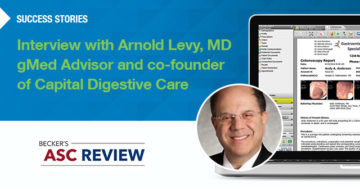Fight for Your Gastroenterology ASC’s Bottom Line: A Guide to Renegotiating Payer Contracts
Strategies for Private Gastroenterology ASCs
This article was originally published on March 29, 2023.
Competition is heating up between hospital outpatient departments and gastroenterology ASCs, but the ASC industry is facing an expected influx of patients. In fact, 10 states already have more ASCs than hospitals,1 even though ASCs regularly get reimbursed at lower rates.2 While preparing for patients to shift to the ASC setting, it might be time to take a fresh look at your payer contracts.
One important strategy to consider is renegotiation of your payer contracts, and using a data-based approach can help provide evidence to strengthen your negotiating position. Through all three phases of a contract negotiation, data may be able to provide you with leverage to negotiate a new contract that more accurately represents the interests of your gastroenterology ASC.
Phase 1: Preparation
Crafting a persuasive argument prior to meeting with your payer representatives sets up your strategy for the entire process. Decide on your key goals and prioritize them, then start gathering the ammunition you need to justify your requests.
Identify potential carve-outs
In this context, the term “carve-out” refers to procedures and services that are paid under a separate arrangement outside of the basic insurance agreement. Sometimes, this involves a third-party contract, and sometimes these are negotiated under other conditions. Carve-outs allow for services not to count toward your capitated payment.3
Identifying potentially beneficial carve-outs can help protect you from financial risk. Making informed selections involves gathering your most current patient quality data, including but not limited to:
- GIQUIC data
- ADR
- Cecal intubation rate
- MIPS data
- Patient satisfaction surveys
It can also be helpful to collect your accounts receivable data, denial percentages and any billing audit results.4
For gGastro® EHR users, gPM™ tracks many of these metrics for easy review with built-in analytics. Additionally, gInsights™ allows you to view provider performance metrics with personalized physician scorecards across multiple facilities. If you’re not currently using gGastro, you may need to reference a separate program to aggregate this data.
Create a value statement
You will need to demonstrate to the payer why it’s worth renegotiating with you in the first place. A value statement will help provide reasons it can’t afford to lose its partnership with you. Think from the payer’s perspective — how will working with you to renegotiate help the company in the long run?
There are a few ways to approach your statement. You could demonstrate your better patient outcomes to support the idea that you could help the payer reduce costs. For example, demonstrating substantially lower than average complication or reoperation rates at your ASC could translate to a lower overall cost per episode of care.5
If you’re considering starting a new procedure or service line, it can be helpful to demonstrate the projected volume of procedures you will now be doing in-house instead of referring to a hospital outpatient department. If you have access to an EOB, you could estimate the potential savings to the payer if it works more closely with you instead of the local hospital.5
Your value statement is where value-based care data can work to your benefit, if you know where to look. For example, with gInsights™, you can evaluate prep types and quality, endo room turnaround time, and endo patient flow-through across facilities, along with adenoma detection rates.
Phase 2: Negotiation
Get to know the payer representatives
Do not begin negotiations asking for a rate increase. Instead, ask the payer reps to list their key initiatives and goals for this year.6 Open your negotiations by showing you’re willing to listen. Identify which of their goals your ASC is best positioned to support before you respond. Then, you can present your quality metrics as evidence by reflecting their language back to them, showing how you can help them achieve their goals.6 Arguing for rate increases or other goals as a way to help the payer can be a powerful strategy.
Brush up on your legalese
It’s a team effort
Document all contact with the payer, even if it’s outside of a scheduled meeting. You’ll want to keep records of email and phone conversations. Remember, you don’t have to negotiate by yourself. Consider including your CEO, certified public accountant and/or data analyst.4
Additionally, consider including your certified coder to verify that your most-used procedure codes are specified and reimbursed to your advantage.7 If you use gPM, you can access some of this data yourself. gPM includes gastroenterology medical billing reports with procedure and diagnosis code frequencies.
If you’re somewhat removed from day-to-day operations, consider including your office manager, who could spot concepts that might look appealing on paper, but might not be beneficial in practice. Finally, it’s advisable to have your legal counsel review the contract prior to signing.4 Each of these team members can provide a unique perspective on the contract, spot potentially unfavorable clauses, and help support you in achieving your goals.
Phase 3: Validation
After your new, renegotiated contract is signed, it’s important to determine how the new terms are affecting your bottom line and your practice as a whole. You’ll want to check your profits of course, but here are some other ways to measure success.
Consider the human element
Are your providers satisfied with their payer interactions? More or less so than in previous years? Has the quality of your patients’ interactions with the payer improved? The national move toward a value-based care model is meant to help patients in the long run, so their voices matter.8
Recheck your quality metrics
Are the performance metrics you were targeting in your renegotiation rising or falling under the new contract terms? If you notice a performance dip, you may need to renegotiate sooner rather than later.8 gInsights can help you compare your providers’ quality metrics to national benchmarks and facility averages, including ADR, withdrawal time, appropriate intervals and more.
Analyze the big picture
Have there been any noticeable market effects since your renegotiation? For example, have new payers interested in contracting with you reached out? Or perhaps you’ve noticed a stronger relationship with your local hospital? These could be signs that your position in the local market is improving.8
Data-informed strategies help drive success
From preparing your argument to evaluating results, using practice-generated data in all three stages of the process keeps you informed and helps you build a strong case for contract renegotiation. A data-driven, strategic relationship with your payers can help protect your practice’s finances.
If you’re looking for clear, succinct practice data to help inform your negotiations, consider using gPM and gInsights as part of your total gGastro solution.
1. “10 states with more ASCs than hospitals,” Becker’s ASC Review (2023 January 23).
2. “Where the relationship between ASCs and payers stands today,” Becker’s ASC Review (2022 December 13).
3. “Carve-out Definition,” Business Benefits Insurance Solutions (2023).
4. “The Nuts and Bolts of Negotiating an Insurance Contract,” ACG GI Practice Toolbox (2019).
5. “ASC-payer negotiations: 1 CEO’s advice for securing the right contracts,” Becker’s ASC Review (2022 August 19).
6. “Law Mind: It’s Not All About That Rate–How to Approach Negotiations with Payers,” ACG Blog (2017 March 15).
7. “How to negotiate physician payer contracts,” Physicians Practice (2022 February 15).
8. “Value-Based Contracting 101: Preparing, Negotiating, and Succeeding,” Revcycle Intelligence (2021 June 1).
This blog is intended for informational purposes only and does not constitute legal or medical advice. Please consult with your legal counsel and other qualified advisors to ensure compliance with applicable laws, regulations and standards.


